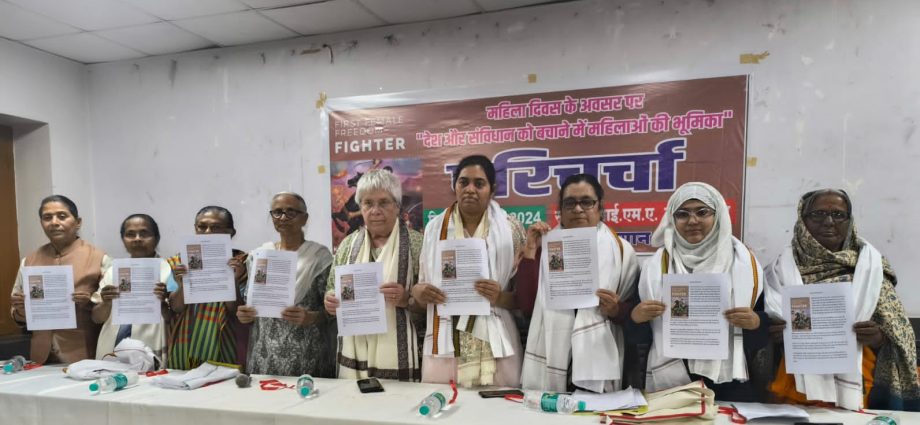By Matters India Reporter
Patna, March 7, 2024: Some 200 women, representing mostly slums in the eastern Indian city of Patna, celebrated the International Women’s Day by pledging to protect the country’s Constitution and democracy.
The March 6 program was inspired by the “Kittur Declaration” that urged Indian women to fight for the land and rights of people of the country, women’s dignity and livelihood.
The declaration was issued by more than 3,500 women from across the country who gathered at Kittur town in Karnataka on February 21 to commemorate the 200th anniversary of Rani Chennamma, a folk hero in Karnataka and the 19th century queen of Kittur princely state who revolted against the British.
At Kittur, some 460 km northwest of Bengaluru, the women’s organizations launched “Naanoo Rani Chennamma” (I too am Rani Chennamma), a nationwide campaign to secure the rights as enshrined in the Constitution, to preserve the social fabric, restore communal harmony and to stand up for the rights of citizens to Reclaim India and reject authoritarianism.
The Kittur declaration was released at Patna too. The participants gathered at Aashray Abhiyan (campaign for shelter), an NGO managed by a Catholic nun in Patna, with the theme, “Role of women in saving the Constitution and democracy of India.”
Felicitas Roelofsen, a cancer surgeon from Germany, was the chief guest, and the special guest was Mukund Singh, spokesperson of the Rashtriya Janata Dal party. Uma Dafftarur from the Am Admi Party also attended.
After the release of the Kittur declaration, Singh invited the gathering to stand up and stretch their right hand and to take an oath to safeguard the Indian constitution and democracy. The Indian Constitution, she added, has kept people bounded as Indians. “We need to uphold this value and relate to each other as human beings,” she said.
Singh spoke about the challenges she faces in politics being a woman from a minority community. Singh said she comes from a family of six girls whose main support was their mother. Today all the girls are well placed in society. She encouraged mothers to hold their daughters’ hands as the first step to their empowerment.
She invited young women to encourage each other and move ahead with determination to develop their talents and assert their space in the world.
Presentation Sister Dorothy Fernandes, director the NGO, noted that the participants were women from all castes, classes, and creeds, and they reviewed women’s contribution to society over the centuries.
“We will put every effort to resolve all differences and to spread love, harmony and fraternity as enshrined in our constitution. We will celebrate our sisterhood, which knows no language, no caste, no class, we stand together with humanity, who are struggling to make both ends meet,” said the activist nun.
She regretted that inflation has affected the women the most, forcing them to make choices to feed, cloth, and educate the family.
“In addition to this, we also see our role as contributing to the economy of the family as we realize in these difficult times, we have to support the family. We have learnt the art of balancing home and work; so, when we speak of governance, we know what we area speaking about,” Sister Fernandes asserted.
Isabel, a prison volunteer, shared her struggles to bring changes the prisons in Bihar’s Motihari and final success. She said she felt great joy, when she manages to rehabilitate prisoners and help them become self-reliant.
Another speaker was Sandra, who has worked in Purvanchal, the eastern part of Uttar Pradesh, encouraging village women to become economically empowered and free from the money lenders.
Ancy has empowered tribal women in Jharkhand’s Hazaribagh by conducting awareness program for three-decades. She has listened with empathy to the tribals’ painful stories of torture at the hands on non-tribals.
Aiman Fatima, a psychologist, shared her work among young women on the periphery, encouraging them to live life on their terms and contribute to create a new India, where their potentials are tapped and channelized.
“We have decided not to give up and do all in our power to translate women power into votes,” Fatima said.
Young women from the settlements credited their mothers with supporting them to realize their dreams.
The participants regretted that women’s contribution has gone unrecognized in India because of the patriarchal society that allowed men to use their power and politics to subjugate women.
Slogans raised during the program were “Phool nahi chingari hain’ (We are not flowers, but sparks), “Shakti ka nam nari hain” (The name of power is women) and “Hum Bharat ke nari hain” (We are the women of India).
The program ended with participants singing, “We shall overcome” with raised hands.










